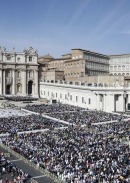Interview: Meet the Mayor
Article:
06.11.19
Interview
Meet the Mayor
Joanna Bogle talks to Councillor Nicholas Bennet about Catholics and local government
We often hear pleas for more Catholics in public life, and by that we usually mean Parliament, or perhaps the mass media. We want to see and hear some voices that reflect Christian values and seem to be genuinely concerned with the common good.
What about local government? Catholics in Britain have a strong tradition here, and perhaps it is due for a revival. Younger Catholics often tend to forget this whole area of life, and concentrate instead on lobbying at the national level, engaging in on-line debates, or taking part in demonstrations on specific topics, notably abortion. But perhaps there are some neglected areas for useful Catholic service which might prove more challenging and more satisfying. Does local government offer some opportunities for useful service?
Public
Nicholas Bennet was Member of Parliament for Pembrokeshire from 1987-1992 and Parliamentary Under-Secretary of for the Welsh Office for the final two years of that time. In 2006 he returned to local politics and is currently Mayor of the London Borough of Bromley. A teacher for several years, he has also worked in educational publishing, and recently retired as a magistrate having served for 21 years.
“We do need more Catholics in public life – it’s important. There have been long-held prejudices against Catholicism, dating back to centuries ago, and we simply have to leave all that aside. We are loyal to our country and have so much to offer.”
“We all know, and keep being told, that we live in a secular age. But our whole society is based on the Christian faith and we need to affirm that.
Schools
“If the Catholic Church and other Christian groups had not established schools in the 19th century we would have no system of education at all. Compulsory education for all children became law in 1870, and was put into effect in 1877, but the Church had been running schools for decades before that, and the state system followed them.”
His year as Mayor began with the Civic Service, traditionally held in the Mayor’s own place of worship which in his case meant St Joseph’s in Bromley. His chosen charities for the year include The Latch Project, a local group which helps young people find accomodatiion. “I sofa-surfed for a while as a student, so I know what it’s like not to have a settled place to live. There are families whose children have left home and have a spare room, and the extra money that a lodger brings is useful. Placing students with families helps both groups. The Latchis a small charity, part-time staff and lots of volunteers.” There is also Careplus, which brings together young volunteers to offer practical help to the elderly. “The importance of everyday help came home when a neighbour lost her bank card and didn’t know what to do. I was able to go to the bank with her and so on – and now she’s connected to a group where people look out for her and can offer help whenever needed. Again, the group has no high-salary chief executive or anything, it’s teamwork and voluntary help.”
But while being Mayor is all about non-political activity, charities and community togetherness, as a councillor and MP he spent years involved in debate, controversy, and politics. He’s emphatic that this too is all part of service to the community and should be seen as such.
Issues
“Of course Catholics can and do disagree with one another on a great range of issues –
there can be legitimate debate about things.”
What about the controversial causes with which local government gets involved today – promoting same-sex marriage and linked ideologies?
“Local authorities don’t have to get involved with issues like that and lots haven’t. It isn’t the necessary role of local government.
“When I was involved in national politics I did have to take a stand, for example making it clear that I couldn’t support anything promoting abortion. Later, locally, I also resigned from a committee that began to offer children for adoption by couples in same-sex unions.”
Understanding
There is no real difficulty, he emphasises, if the Church makes its position clear so that people can understand it.
“The Church needs to have some intellectual heft in its public pronouncements – that’s what makes the difference. Then when new issues come up, you don’t have a difficulty: it’s clear where you stand. And in fact people will respect it.
“We need much more clear teaching – more pastoral letters from our bishops with the principles spelled out. It’s the principles that matter: we can then deal with the practicalities from there.”
Home
Bromley has been home for many years. He grew up in an Army family and moved about a good deal during his childhood. He gained a degree in philosophy at the North London polytechnic and followed it with an MA from Surrey University. Politics began in Lewisham Council in the 1970s. He is married to Ruth, who has also served as a borough councillor.
We are talking over an informal salad lunch. His morning had been spent at a citizenship ceremony – people from Bulgaria, Poland and Bangladesh being sworn in - and as the meal finishes his mace-bearer arrives with robes and mace for the afternoon’s events. The talk turns to history and I learn the story of Bromley’s ceremonial mace as the Mayor is fitted into lace cuffs and fur-trimmed robe.
Notes:
Joanna Bogle is editor of Faith magazine.





